|
|
|
Sort Order |
|
|
|
Items / Page
|
|
|
|
|
|
|
| Srl | Item |
| 1 |
ID:
084859


|
|
|
| 2 |
ID:
161130


|
|
|
|
|
| Summary/Abstract |
This article starts from the observation that whenever new concepts become popular, they are applied to more and more contexts until they have become so inclusive that they risk losing their analytical power. This tendency also shapes the relationship between the concepts of transnationality and translocality, which is discussed here with a focus on popular music. More precisely, this article draws on research on two musical actors who are both based in the French city of Marseilles and who both relate to the Indian Ocean archipelago of Comoros: the internationally acclaimed rapper Soprano and the group Afropa, who play Afrofolk on the margins of the music scene in Marseilles. Besides the different levels of success they experience and the distinct musical genres they embody, these musicians represent different generations of a Franco-Comorian ‘diaspora’. Their musical oeuvre, motivations and ambitions, as well as the perception of their music by different audiences, will be discussed with respect to the notions of transnationalism and translocality that become apparent.
|
|
|
|
|
|
|
|
|
|
|
|
|
|
|
|
| 3 |
ID:
091783
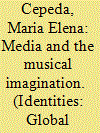

|
|
|
|
|
| Publication |
2009.
|
| Summary/Abstract |
In May 2006, United States residents were witness to the largest pro-immigrant cross-country protests in the nation's history. During the apex of the pro-immigrant demonstrations, the single "Nuestro Himno," a Spanish-language paraphrasing of "The Star-Spangled Banner," was released. Both the "Nuestro Himno" recording and the demonstrations constituted important symbolic gestures toward the (re)claiming of U.S. public space and the contested meanings of citizenship, nation, and belonging. This essay commences with an overview of recent debates on cultural citizenship, followed by a discussion of the "musical imagiNation" as it pertains to Latino popular music in general. I juxtapose this commentary against a critical discourse analysis of mainstream (English-language) Internet and print media discourse regarding the "Nuestro Himno" recording and an audiovisual analysis of the hit video "Reggaeton Latino (Chosen Few Remix)" (2005). Employing "Nuestro Himno" as a analytical lens, I propose a (re)evaluation of the differential notions of (cultural) citizenship and family foregrounded in official and popular discourses: How does the discourse of family and nation that emerges from the media coverage of "Nuestro Himno" reflect prevailing beliefs about citizenship, belonging, and language? And if the marches of the spring of 2006 embody the political and social possibilities of cultural citizenship, then how are we to understand the contradictory underlying discourse of one of reggaeton most popular music videos, despite its seemingly inclusive promotion of the pan-Latino familia?
|
|
|
|
|
|
|
|
|
|
|
|
|
|
|
|
| 4 |
ID:
120361
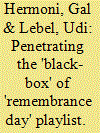

|
|
|
|
|
| Publication |
2013.
|
| Summary/Abstract |
This article examines the musical repertoire broadcast on Israeli state radio stations on Remembrance Day. Commencing with the first Remembrance Day, Israeli radio stations have refrained from broadcasting songs that do not contribute to the glorification of the military mythology or failure to reinforce the consensual perception of national loss. In view of globalization - it might be assumed that Remembrance Day songs would undergo changes in tune with the times. From a musical point of view, new songs that belong to what Regev and Seroussi classify as 'globalizing Israel' penetrated into the nationalist arena. But, following Inglehart and Baker, these songs, despite their seemingly secular façade, remain limited hegemonic enclosures organized around the core of founding values. Apparently, this is an example of the process of glocalization of culture. The article seeks answers to the strategies employed to accommodate these new songs to the traditional ideology of the classical Remembrance Day songs and examines whether the mechanisms of legitimacy that enable the inclusion of new voices on Remembrance Day, can be identified. We argue that their choice is not arbitrary and that they illustrate the manner by which voluntary cultural entrepreneurs (musical editors) are co-opted in the postnational condition.
|
|
|
|
|
|
|
|
|
|
|
|
|
|
|
|
| 5 |
ID:
084861
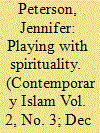

|
|
|
| 6 |
ID:
119168
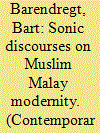

|
|
|
|
|
| Publication |
2012.
|
| Summary/Abstract |
Not only has Nasyid music been successful in addressing questions about what it is to be a modern Muslim youth in Southeast Asia, reconciling piety with a "funky but shariah" consumerist lifestyle; it also has been expressive of political aspirations for a utopian-style communal society. This essay focuses on how, from the late 1980s to the mid-1990s, the Malaysian missionary movement Al-Arqam used nasyid music to articulate ideas of Muslim Malay modernity and on how nasyid music became one of the main interfaces to spread the Arqam message beyond its model villages. The focus is on Arqam's main ensembles, Nadamurni and the Zikr, and, with the 1994 ban on Arqam's activities, the celebrated pop group Raihan. Raihan's sonic explorations into Muslim Malay modernity have challenged orthodox Islamic ideas, but also the entertainment industry and the secular Malaysian state at large. Nasyid culture provides us with an understanding of the larger changes that have occurred within Southeast Asian Islam, away from a previous Islamic revival and toward a post-Islamist chic and new cultural performances that successfully blend entertainment and education.
|
|
|
|
|
|
|
|
|
|
|
|
|
|
|
|
| 7 |
ID:
119408


|
|
|
|
|
| Publication |
2013.
|
| Summary/Abstract |
Both political activism by pop musicians and the discussion of popular culture in international relations (IR) have been on the rise in recent years. A closer look at the political meaning of mainstream pop songs, however, is still missing. Therefore, we examine the political worldviews that become manifest in the lyrics of US and German top ten hits from 1960 to 2009. A remarkable feature of these worldviews is the rejection of political institutions and actors in a mood of alienation and disenchantment, along with a strong appeal to the responsibility of individuals to autonomously tackle societal deficiencies. This appeal is based on a pronounced trust in people's capacity to solve problems jointly and without any interference by institutionalized politics. In this context, the growing recognition of political activism by so-called celebrity diplomats may be linked to these worldviews. Reflections on normative implications of the political worldviews, in turn, raise delicate questions about legitimate agency and the way public affairs are organized.
|
|
|
|
|
|
|
|
|
|
|
|
|
|
|
|
| 8 |
ID:
138973
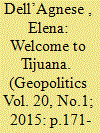

|
|
|
|
|
| Summary/Abstract |
Popular music has not yet been widely considered by popular geopolitics practitioners. This paper develops such a perspective, using the US–Mexico border as a case study. In the area, the classic corrido and the more recent narcocorridos are flourishing. Their lyrics, exalting the deeds of border trespassers, usually represent the border as a superimposed boundary. Around the border, other more hybrid kinds of music stand for a very mixed borderland. The border is also portrayed in Anglo songs, referring to the ‘South of the border’ experience. In these, depiction leaves room for a different perception, since the border is represented as an open frontier, easy to cross, to find an abundance of girls and alcohol on the other side. Popular music can also offer a metaphorical representation of the US–Mexico border, transforming it from a local space to the symbol of all global power asymmetries, as in Manu Chao’s songs.
|
|
|
|
|
|
|
|
|
|
|
|
|
|
|
|
| 9 |
ID:
125174
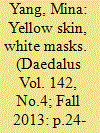

|
|
|
|
|
| Publication |
2013.
|
| Summary/Abstract |
Ethnic studies scholars have long bemoaned the near absence of Asians on the big and small screens and popular music charts in the United States, rendering them as outsiders vis-à-vis the American public sphere. In the last few years, however, Asians have sprung up on shows like "Glee" and "America's Best Dance Crew" in disproportionately large numbers, challenging entrenched stereotypes and creating new audiovisual associations with Asianness. This essay considers how emerging Asian American hiphop dancers and musicians negotiate their self-representation in different contexts and what their strategies reveal about the postmillennial Asian youth's relationship to American and transpacific culture and the outer limits of American music.
|
|
|
|
|
|
|
|
|
|
|
|
|
|
|
|
|
|
|
|
|